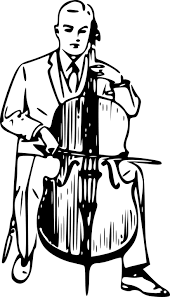How Much Practice Makes Music Perfect?
December 3, 2018
Being a musician takes a lot of confidence, effort, and dedication. Speaking from personal experience, being a musician means sometimes you can’t always get in the practice time you need. Practicing for me sometimes feels like a chore, but I know it has to get done. School and work always seem to get in the way (which of course is never an excuse for any musician), but still, it’s always in the way for many musicians. I have been a musician for almost ten years now, and I’m still trying to find that perfect balance of getting all my practice time in that I need and dealing with other life situations as well.
To be proficient in practice, you may need some guidance. The routine that my piano teacher and I established for piano practicing is 30-45 minutes, three days a week. This routine also gives me enough time to fit in all my school work, and extra orchestra rehearsal and practice time. Practicing for two different orchestras is challenging, but I do the same routine for that as I do with the piano. Six days out of the week I’m practicing as much as I can fit in. If I’m home with free time, I go straight to my piano. Getting time to practice my viola is always a challenge because I don’t always have the time or have it with me. If I have any free time during school, I can go straight to the band room. As a musician, you become desperate sometimes trying to find time to practice, but you do what works. The reason I’m telling you this is so you can get an idea yourself of what might work for you. Practicing is so significant to a musician, especially if you’re planning on doing music as a future career, hobby, etc.
I also talked with a fellow musician from my Fruita Monument High School named Dillon Gross. I asked her experience on getting in proficient practicing time. She said; “I think it’s not really how much you practice but how well you practice. I feel like at some level everyone should practice for at least 15-30 minutes a day, but if you’re just practicing what you know just to get really good at it then it’s kind of worthless. You have to practice what you’re not good at in order to get better. For high school musicians, schedules get busy but you should try to fit in some time every night. Professional musicians obviously need much more practice.” What she said is absolutely true. Being a musician’s about working on the harder parts to get better, rather than just the easy parts. Ten minutes of good practice is better than thirty minutes of inefficient practice.
In the article, “Practicing the Art of Practicing” by Daniel Weidlein it talks about being a musician and how practice is very important taking on advice from Carl Allen, Artistic Director of Jazz Studies at Julliard. He gives advice to the writer that I’ve heard this from every music teacher I’ve ever had: “absolutely in no way should I consider a rehearsal or other group playing situation a part of my practice. Sure it’s all valuable experience, he said, but playing with other people is not practicing—you need both. He then suggested that if I practiced for those twelve hours a day on top of everything else, just think how much better I would be…” This advice is very true. Practicing alone gives you time to hear yourself and what you need to work on personally and specifically. When you’re playing with a group, you may hit a tough few measures and maybe you think you played that spot well. I know this situation has happened to me many times, but once you go home to practice that part you hear what you actually sound like. Then you realize your conductor is right that your section sounds like a dying cat.
To improve you need to set goals. Setting goals gives you a path to follow. Setting large goals though is easy. For example, “I want to learn ‘Piano Man’ by Billy Joel by next week” is a goal, but a goal that big might be challenging or even impossible for some to achieve. You need to put more thought into your goal. You can learn “Piano Man” but maybe in the first week, you get to know the piece, like its rhythm, techniques, and make sure to count. Then the following week spends your practice time focusing on dynamics. Practicing a piece of music as a musician, no matter what type of musician you are, a violinist, pianist, singer, percussionist, or a wind player. Practicing brings so much value into your playing. Once you realize that, practicing is gonna be like brushing your teeth; it simply becomes a good habit of mind.
It’s easier said than done, that’s for sure. I guess you could say you need to “practice the art of practicing.” Being a musician is most definitely not easy. The more you practice though, you will gain so much confidence in your playing. That confidence is the best part about being a musician and being able to share it with others. So practice always as a musician, it’s the only way to be proficient and to get better.
